Wind Rider by Susan Williams
Set on the steppes of western Asia six thousand years ago, Wind Rider is a multifaceted tale of one girl’s coming of age interwoven with a narrative about the first domestication of horses by the Botai people of modern-day Kazakhstan.
Fern and her brother Flint live with the stigma of being the only set of twins in their community. By all accounts, Fern should have been left to die, but, after suffering from stillbirths for many years, Fern’s mother Moss fought against the odds to keep both children. Already an anomaly in the superstitious
ahne (a group of families that travel together during the warm months), Fern’s unique personality makes her stand out even more. She’s a strange girl who befriends animals and would rather be out hunting than sewing herself a new tunic.
As Fern begins to become an adult, she envies her brother’s freedom:
Choices, excitement, and honor lay ahead for Flint. I, on the other hand, would no sooner find blood running between my legs than I would be packed off to begin growing babies, tending pots and scraping skins for some young man as reckless and stupid as my bother, who, like him, would not listen to anything I had to say. (6)
Everything changes for Fern when she finds a young horse trapped in a bog. Unwilling to let the filly become her
ahne’s next meal, she rescues the young horse and cares for her in secret. With Thunder, Fern’s life has new purpose. As Fern experiments riding, she and Thunder only grow closer.
It is only when Thunder is needed to bring an injured Flint to safety that Fern risks revealing her secret. While many in the
ahne see Thunder only as a potential meal (and Fern with her animal “magic” as a witch), a few elders are convinced of the efficacy of keeping Thunder as a pet and workhorse. As Fern shows the community all the things that Thunder can do, they become more accustomed to and accepting of the horse in their midst. However, when famine strikes, it becomes increasingly difficult for Fern to justify keeping Thunder.
While this first-person narrative is a bit slow to start — which may be reflective of the pace of the life in this prehistoric community — it evolves into a suspenseful adventure story, in which both Fern and Thunder’s lives are at risk.
Courageous and rebellious, Fern is an imperfect character sure to strike a chord with young readers. Fern’s coming of age is less about becoming an independent woman than it is about growing into her role in the community. When severe depression makes Moss unable to care for Fern’s baby sister, Fern does everything in her power to keep Spring alive. It is only then that Fern begins to realize that the life of a wife and mother is more than just a life of servitude.
More than the story of the domestication of horses,
Wind Rider charts the course Fern must take in order to develop the self-confidence to be comfortable in her own skin. While Fern becomes a legend in her own time, her greater accomplishment is learning to see her twin as a friend and partner rather than a rival.
Well-crafted and carefully researched,
Wind Rider is a novel that can be enjoyed by children and adults alike. Williams’ descriptions of the Botai people and their life are at once completely foreign and surprisingly recognizable. Her mix of folklore and anthropology, as well as her obvious love for her characters, lend the novel a sense of authenticity.
Read my full review of this lovely book at
Curled Up With a Good Kids Book...
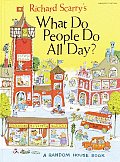 Last weekend Russell and I attended a birthday party for a one year-old. We brought two books for the birthday girl, The Adventures of Lowly Worm and What Do People Do All Day? both by Richard Scarry. Here's more or less what I wrote in the card:
Last weekend Russell and I attended a birthday party for a one year-old. We brought two books for the birthday girl, The Adventures of Lowly Worm and What Do People Do All Day? both by Richard Scarry. Here's more or less what I wrote in the card:
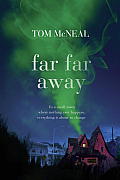 Jacob Grimm, the eldest of the famous Brothers Grimm, is a troubled soul caught in the Zwischenraum, the place between. After years attempting to discover and resolve "the thing undone" (that which is keeping him in limbo), Jacob learns from another ghost of an Exceptional, one of the few living souls who can hear ghosts speak, and a "Finder of Occasions who would bring harm to the boy" (48). Jacob determines to find the boy and to protect him from the Finder of Occasions.
Jacob Grimm, the eldest of the famous Brothers Grimm, is a troubled soul caught in the Zwischenraum, the place between. After years attempting to discover and resolve "the thing undone" (that which is keeping him in limbo), Jacob learns from another ghost of an Exceptional, one of the few living souls who can hear ghosts speak, and a "Finder of Occasions who would bring harm to the boy" (48). Jacob determines to find the boy and to protect him from the Finder of Occasions.
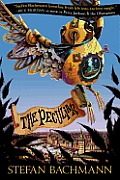 Changeling — The child of a faery and a human, a changeling is small, sickly, and sharp-faced, and, if his faery-blood is particularly strong, he will have branches growing out of his head instead of hair. He is not expected to live past the age of twelve. [...] Half-bloods are forever being hung by the superstitious lower class, or stolen by the faeries who hate them for their ugliness. They spend most of their short lives locked-up and hidden away. (Bachmann's
Changeling — The child of a faery and a human, a changeling is small, sickly, and sharp-faced, and, if his faery-blood is particularly strong, he will have branches growing out of his head instead of hair. He is not expected to live past the age of twelve. [...] Half-bloods are forever being hung by the superstitious lower class, or stolen by the faeries who hate them for their ugliness. They spend most of their short lives locked-up and hidden away. (Bachmann's 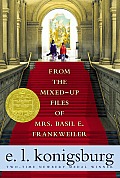 Claudia knew that she could never pull off the old-fashioned kind of running away...so she decided not to run FROM somewhere, but TO somewhere. And so, after some careful planning, she and her younger brother, Jamie, escaped — right into a mystery that made headlines!
Claudia knew that she could never pull off the old-fashioned kind of running away...so she decided not to run FROM somewhere, but TO somewhere. And so, after some careful planning, she and her younger brother, Jamie, escaped — right into a mystery that made headlines!
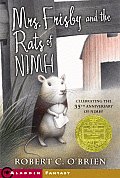 Mrs. Frisby, a widowed mouse with four small children, is faced with a terrible problem. She must move her family to their summer quarters immediately, or face almost certain death. But her youngest son, Timothy, lies ill with pneumonia and must not be moved. Fortunately, she encounters the rats of NIMH, an extraordinary breed of highly intelligent creatures, who come up with a brilliant solution to her dilemma.
Mrs. Frisby, a widowed mouse with four small children, is faced with a terrible problem. She must move her family to their summer quarters immediately, or face almost certain death. But her youngest son, Timothy, lies ill with pneumonia and must not be moved. Fortunately, she encounters the rats of NIMH, an extraordinary breed of highly intelligent creatures, who come up with a brilliant solution to her dilemma.
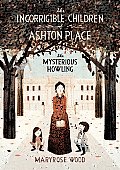 The first book in the Incorrigble Children of Ashton Place series.
The first book in the Incorrigble Children of Ashton Place series. 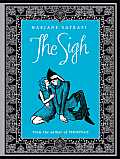 Rose is one of three daughters of a rich merchant who always brings gifts for his girls from the market. One day Rose asks for the seed of a blue bean, but he fails to find one for her. She lets out a sigh in resignation, and her sigh attracts the Sigh, a mysterious being that brings the seed she desired to the merchant. But every debt has to be paid, and every gift has a price, and the Sigh returns a year later to take the merchants daughter to a secret and distant palace.
Rose is one of three daughters of a rich merchant who always brings gifts for his girls from the market. One day Rose asks for the seed of a blue bean, but he fails to find one for her. She lets out a sigh in resignation, and her sigh attracts the Sigh, a mysterious being that brings the seed she desired to the merchant. But every debt has to be paid, and every gift has a price, and the Sigh returns a year later to take the merchants daughter to a secret and distant palace.
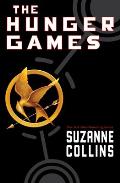 I'm loaning one of my new coworkers the
I'm loaning one of my new coworkers the 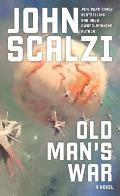 Last year I read
Last year I read 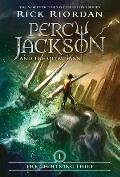 I've been in a book spiral for the
I've been in a book spiral for the 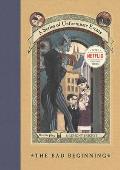 I had to admit that while I've collected all the books in Lemony Snicket's
I had to admit that while I've collected all the books in Lemony Snicket's 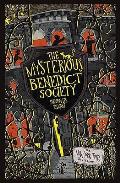 Four children with unusual talents are recruited for a top-secret mission. There is only one rule - there are no rules.
Four children with unusual talents are recruited for a top-secret mission. There is only one rule - there are no rules. 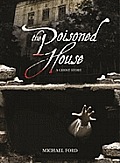 The following papers were kindly donated to the Municipal Library by Anne Merchant, the current owner of 112 Park Avenue, the property formerly known as Greave Hall. [...] They appear to record several months in the year 1855 of the life of a teenage girl called Abigail Tamper, who lived and worked at that address. [...] Pages from the original can be viewed in situ at the discretion of the librarian. (7)
The following papers were kindly donated to the Municipal Library by Anne Merchant, the current owner of 112 Park Avenue, the property formerly known as Greave Hall. [...] They appear to record several months in the year 1855 of the life of a teenage girl called Abigail Tamper, who lived and worked at that address. [...] Pages from the original can be viewed in situ at the discretion of the librarian. (7) Above is the cover art for the American edition (coming September 2011), which I find to be a tad too horror movie-like for my taste (it’s that grasping hand). I’m much more fond of the cover of the UK edition (published in August 2010). It’s subtler, with an atmospheric spookiness that seems much more appropriate for the story.
Above is the cover art for the American edition (coming September 2011), which I find to be a tad too horror movie-like for my taste (it’s that grasping hand). I’m much more fond of the cover of the UK edition (published in August 2010). It’s subtler, with an atmospheric spookiness that seems much more appropriate for the story.